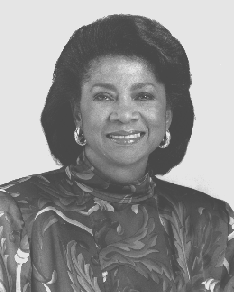Page 126
[Begin Tape 1, Side A]
Biagi: Belva, tell me about your assignment now at KRON, exactly what you're doing there.
Davis: I'm at an interlude. I've just finished coverage of the election of 1992, which for me was one of the most exciting periods of my career. It was exciting because of the fact that a topic that I thought was going to bloom many years earlier finally, finally the blossoms came out, and that was that I covered the Year of the Woman in Politics. It's something that I had been projecting would happen in prior election years, and it finally happened in 1992.
So at this period I'm doing clean-up from the election, looking forward to going to the inauguration in Washington—it will be my first—and then coming back and sort of reassessing what I'd like to do from here on in. I know that my interest is varied, but at the bottom of all of it, generally it's about the kinds of stories that attract me or ones in which I can somehow help people who don't have a voice somehow find it. That's a very broad way of putting it, and that means programs and people.
For instance, the stories I've lined up so far are stories about developmentally disabled people who are fighting their way into the workforce, the new laws that give them the ability to push folks into doing things. So that's a story I'll do next Monday. The second story I'm doing is about a couple of young African-American guys who have gone into the manufacturing business, someplace that blacks have not much of a track record. We've not been manufacturers of anything; mostly we've been in the consuming side of the business world. So I'll do that, because I think it's a new trend, and hope that it will give encouragement to others to step out there.
So I don't know what I'm going to call what I'm doing, but I still have the same title of urban affairs specialist for KRON, and with the privilege of trying to develop that into something that I can find some gratification doing.
Biagi: When you think about your career in journalism, can you talk to me a little bit about why you got into the business and why you think what you do is important?
Davis: I got into it because, of course, I'm a woman and a minority. Both of those labels would say that I was on the side of the powerless. I think because of race, first, and gender, second, I just felt that a large segment of our society simply wasn't being heard.
Why I decided I should be a messenger is different, is something more complex than I can explain here, but it was the motivating reason. I just felt that we need to hear from all elements of the American society, and certainly I knew a lot about what black people were saying to each

